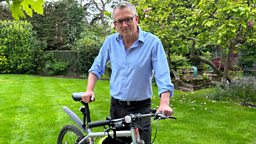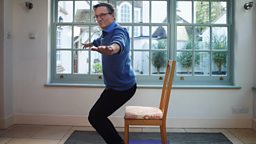10 easy ways to boost your health and wellbeing during your working day
What a difference a day makes, goes the song, and with a few simple additions to your daily routine you could well be singing the same tune, enjoying improvements to your mental and physical health.
In his podcast, Just One Thing, Dr Michael Mosley guides you through many different ways to achieve healthier and happier living. Here’s a selection of his tips which you might like to incorporate into your working day…

Before work
Go for an early morning walk
Even on the dullest of days, going for a brisk walk before starting work, or even on the way to work, will give you a burst of morning light that will stop the production of the sleep hormone melatonin and signal to the body that the day has begun. The jump-starting of your body clock with a morning walk will help you sleep better in the evening. If you work late shifts, a walk within two hours of waking will give the best results, as you will still be benefiting from blue, short-wave light.
In one study, people who had a cold shower every morning for 60 days took 30% fewer sick days.
> How to get more health benefits from your daily walk
Have a cold shower
If you start the working day with a shower, think about turning down the temperature. Even just a 30-second cold shower every morning can be beneficial. In one study, people who did this for 60 days took 30% fewer sick days.
Scientists believe that cold water exposure boosts immunity by decreasing the body’s inflammatory responses. Among other positives, it also increases dopamine, serotonin and b-endorphin.
> Why we should all be taking cold showers

At work
Drink coffee
Coffee might already be the highlight of your mid-morning break. If it is, you’re benefitting from a rich source of polyphenols, an antioxidant that has anti-inflammatory effects.

An expansive UK study suggested that those who drank up to three cups of coffee daily experienced better heart and brain function. Meanwhile, other studies, at lower doses, have shown that caffeine can stimulate feelings of wellbeing and enhanced attention.
> Can coffee make you fitter?
Take regular breaks
Studies involving professionals from office workers to surgeons have shown that microbreaks of even just a few minutes can lower heart rate and reduce cortisol. Breaks also allow you to let your mind wander, and shifting focus can help with creative thinking, improving mood, decision-making and processing information. Taking time away from your screen will give your eyes a much-needed rest too.
> Why you should take more breaks
Drink water
Water makes up 60% of our bodies and 90% of our brains, and even a loss of 1-2% body water can affect mental capacity so it’s vital to stay hydrated. Taking regular sips from a water bottle on your desk could make reaching the target of two litres a of water a day for men, or 1.6 litres for women, that much easier. Watching over your water intake means that you maintain kidney function, keep your skin hydrated and improve short-term memory, working memory and attention span.
> Listen to the Drink Water episode
Stand up
Yes, it’s that simple. Whether you’re standing at your desk or walking around your office making a call, gravity is doing good things for you!

Prolonged sitting is linked to poor health outcomes, including an increased risk of heart disease and Type 2 diabetes. Just by standing up for a couple of minutes two or three times a day you are raising your heart rate and helping your metabolism by lowering blood sugars, and therefore burning off calories. It could even improve your psychological health, and make you more engaged with the task at hand.
> Listen to the Stand Up episode
Eat small portions of nuts and dark chocolate
Flagging during an afternoon meeting? A daily snack of 15-30g of nuts and two pieces of dark chocolate could help. Like coffee, both nuts and dark chocolate are high in polyphenols and have beneficial cognitive effects, such as boosting short-term memory, fluency and attention.
In the right amount they have other benefits too. Nuts have been shown to improve energy levels, reduce the risk of cancer and diabetes and even slow the aging process. Meanwhile, dark chocolate, which is high in the flavonoid group of polyphenols, could improve the elasticity of blood vessels, insulin sensitivity and cholesterol levels in women with Type 2 diabetes.
> Good news! Dr Michael Mosley says chocolate is good for you
Meditate
Breaking up the working day to meditate might seem counter-intuitive when the pressure is on, but just a small 10-minute session each day can improve your sleep, mood, boost your immune system and even physically rewire your response to stress and pain.
An eight-week study revealed that meditation brings all these benefits by reducing the size of the amygdala, the part of the brain that, under pressure, releases more of the stress hormone cortisol and dulls your immune system.
Learning how to meditate is easier than you think too, with loads of free resources online as well as in-person classes.
> How meditation can help your mood, memory and immune system

Does meditation really work?
Dr Michael Mosley explores how meditation physically changes your brain for the better.
After work
Have a hot bath
Unwinding with a hot bath or shower at the end of the day is not only relaxing, it can help you fall asleep up to 36% faster, enjoy a better quality of sleep and feel more rested the next day.

A study suggests that people who read for 30 minutes a day live nearly two years longer than those that don’t.
By warming parts of your body, especially your hands and feet, special blood vessels that radiate heat start to dilate. This pushes more of your blood to the skin's surface, which helps speed up heat loss, so that your core temperature drops – and this acts as a signal for sleep.
> Listen to the Hot Bath episode
Read a novel
At the end of a working day, it’s very tempting to flop on the sofa and binge the latest box set. However, reading a novel for 15-30 minutes instead staying up late to finish a TV series could have a significant impact on your readiness for the next working day. This is because reading fiction increases connectivity in the brain and create new neural pathways, and has also been credited with lowering the stress hormone cortisol and raising the "love" hormone, oxytocin. If you’re still not convinced to pick up a book, a study suggests that people who read for 30 minutes a day live nearly two years longer than those that don’t!

















































